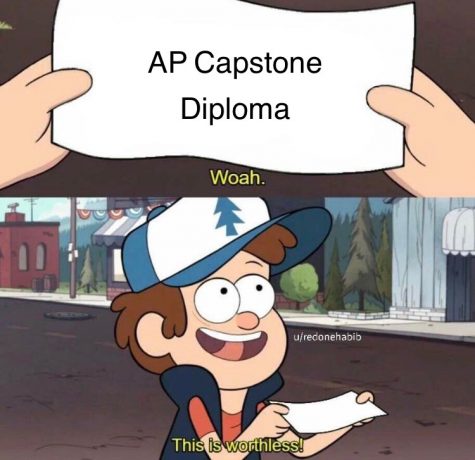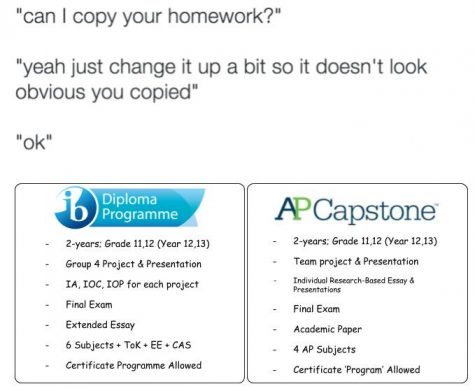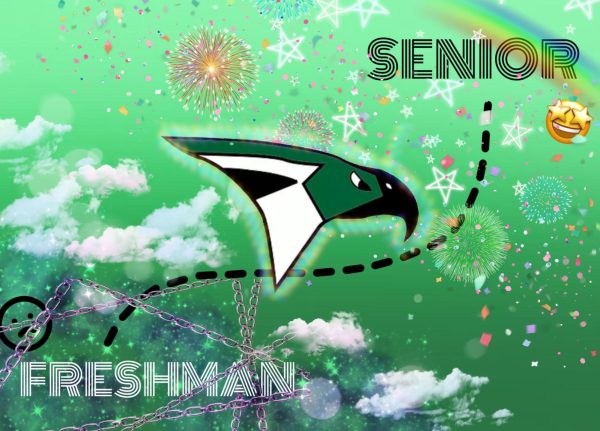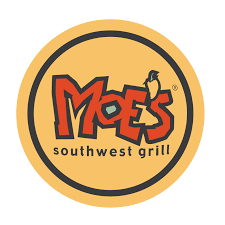Opinion: Capstone is Not Working
And it’s not going anywhere.
In 2017, Academic Magnet students were first informed of the removal of the Thesis program, an iconic (and infamous in the eyes of some) fixture of AMHS. The program was to be replaced by the AP Capstone Diploma Program offered by the College Board, whose purpose, as described on their website is to “develop students’ skills in research, analysis, evidence-based arguments, collaboration, writing, and presenting”. The change was reportedly mandated by the state, as their investigation into Charleston County Schools led to findings that many classes offered were not in accordance with state-regulated classes. Capstone’s similarities to Thesis, such as the year-long research paper, focus on investigation skills, and presentation of the project, made the program seem like a suitable replacement; however, many have had their objections over its duration.
 One advantage that the Capstone program supposedly has over Thesis is its acceptance as college credit, like all other AP classes. However, while your proficient scores on the AP Biology exam may exempt you from an introductory science course in college, the AP Capstone years only count as an elective credit, rendering the credit somewhat useless. Elective credits are not difficult to come by in college, as they often help students refine their career path and study their own interests as a break to more rigorous courses. Finally, very few colleges accept the Capstone credit as it’s not well known or proven, as it is such a new program. As far as in-state colleges go, Clemson and USC offer a very minimal 3 elective credit hours for passing grades in Seminar and Research while CofC offers up to 6 hours as introductory English depending on your score on the End of Course Exam in each course (6 hours awarded for the score of 5). Furman and Wofford do not appear to accept the class. Many higher-brow institutions (such as Harvard, Stanford, UNC, UVA, and many others) don’t accept the class either.
One advantage that the Capstone program supposedly has over Thesis is its acceptance as college credit, like all other AP classes. However, while your proficient scores on the AP Biology exam may exempt you from an introductory science course in college, the AP Capstone years only count as an elective credit, rendering the credit somewhat useless. Elective credits are not difficult to come by in college, as they often help students refine their career path and study their own interests as a break to more rigorous courses. Finally, very few colleges accept the Capstone credit as it’s not well known or proven, as it is such a new program. As far as in-state colleges go, Clemson and USC offer a very minimal 3 elective credit hours for passing grades in Seminar and Research while CofC offers up to 6 hours as introductory English depending on your score on the End of Course Exam in each course (6 hours awarded for the score of 5). Furman and Wofford do not appear to accept the class. Many higher-brow institutions (such as Harvard, Stanford, UNC, UVA, and many others) don’t accept the class either.
One significant issue I have noticed is the number of students who have either barely started or are at least far behind benchmarks. I’m in no way pointing fingers though; I am willing to admit that personally I’m far behind schedule, but I am far from alone. While there are a few students who have remained diligent in their writing and data collection, it feels like the majority of the grade has been unable to keep up whether it be from unpreparedness, procrastination, or simply biting off more they can chew.
This is hardly the students’ fault, however. Students are being blamed for the shortcoming of the program, while the real issue is the rough transitional period away from a previously functioning system. With the thesis program, the research paper was started second-semester junior year and continued through the summer (admittedly, much to the chagrin of students) to be presented usually in the first-semester senior year. The reward of being able to present whenever ready was a large motivator to be on top of the workload in order to be done with the stress. Capstone students all must present in May, however, allowing much more feet dragging with few motivators to follow through, as we are already into college. Thesis students also had the added advantage of being able to include their projects as supplementary materials requested by some applications or discuss their completion in college interviews.
Further, the one-on-one advisement previously given was much more effective than the near 30 to 1 ratio from the current setup of teacher advisers. A more personal approach to oversight would improve not only achieving deadlines but the overall quality of work as well.

Personally, as a member of the first grade in Magnet’s history to complete the Capstone program, I have felt firsthand the workload of this course, which one can imagine is similar to the workload of TOK and Thesis, but in my opinion, produces far less fruitful results. The project of yesteryear seemed much more imaginative and applicable to the real world. Some examples that I found by randomly pulling papers out of the thesis archives located in the library examples were:
Effective treatment of Acute Chest Syndrome (Patrice Capers, 2003)
Evaluation of Acupuncture as an Adjunct of Osteoarthritis in 10 Canine Patients (Dana Leben, 2008)
Endothelial Nitric Oxide Synthase Activity in Endothelial Cells with Systemic Lupus Erythematosus (Emily J. Tonks)
Simulating the Radioactive Decay of the Fission Products of Uranium-235 as a Function of Time (Ben Gilbert, 2012)
And a staggering 251-page thesis titled Security Analysis of Alternative Databases (Michael Caddell)
This year’s research projects, however, have seemed overwhelmingly focused on the atmosphere of Magnet. Is this representative of a recent increased interest in the lives and stress levels of Magnet? Unlikely. Rather, the stringent requirements set by the College Board have caused many to have to limit themselves to performing surveys on the most convenient sample available. I predict that if you are on the board reviewing the upcoming Oral Defenses, you will hear many projects with the phrase “testing [insert topic] in a high performing school’s atmosphere” in their title. Spoiler alert, AMHS is said high performing school. One of these restrictions is the very specific limit to the amount of aid that can be given by expert advisers. College Board specifically stipulates that they cannot conduct any of the research or help the student analyze any of their results, making it almost an unnecessary position except for the occasional professional advice.
While I clearly have many issues with the program, in no way do I mean to discredit the work of the teachers who have volunteered to lead this program in its debut year. Their courage and tenacity are well noted as they learn the curriculum alongside the rest of us. It is a challenge for everyone involved, and they have genuinely all put in hours of effort to try to help us succeed. At times they have expressed frustration, but never doubt, which is inspiring considering the high levels of burn-out at this point in the year. Furthermore, I understand that Capstone is new, and we have to give it a shot for more than one year in order to get the bumps worked out. I hope that the program sees improvements in the near future, but until then, good luck Juniors.








